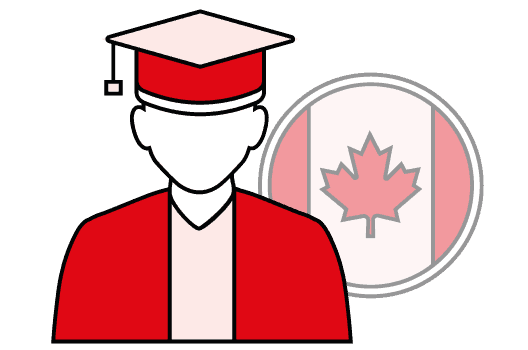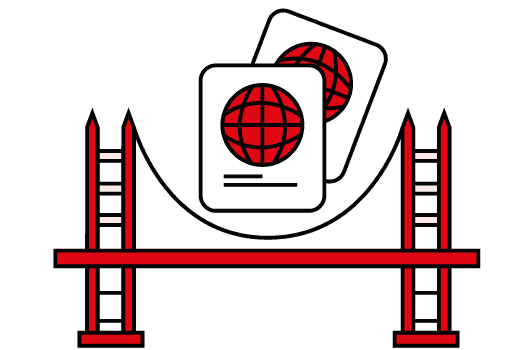What is a Canadian Citizen?
A Canadian citizen is someone who is a legal resident of Canada. They must be a citizen of Canada in order to vote, hold office, or receive certain benefits. In order to become a Canadian citizen, one must be born in Canada, have at least one parent who is a Canadian citizen, or be granted citizenship through naturalization.
Below we explain how to become naturalised in Canada as this is the most common route to obtaining Canadian citizenship.
What are the eligibility requirements?
Depending on your situation, there may be additional requirements.
Be at least 18 years old
Be a permanent resident
Have physically lived in Canada for 3 (1,095 days) out of the last 5 years
Have filed income taxes (if applicable) for each of the 3 years
Pass a citizenship test (if between 18-54 years old)
Meet the required language proficiency score in English or French (if between 18-54 years old)
Take the Oath of Citizenship
Applying for Citizenship
Those who want to become a Canadian citizen must first submit an application to the government of Canada, specifically; Immigration, Refugees and Citizenship Canada (IRCC).
Applicants who fulfil the criteria will be asked to sit for and pass the citizenship test. IRCC will provide study material to help citizenship applicants pass the 30-minute test. Ensure when you take the test you take an identification document to prove who you are.
To be eligible for citizenship in Canada, individuals must fulfill the required language requirements and provide either:
- A certification or degree from a secondary or post-secondary institution proving that studies were completed in English or French
- Language test results from a testing agency approved by IRCC; or
- A certificate verifying that you have completed the Canadian Level Benchmark 4
Only applicants between the ages of 18 – 54 will be required to take the test and provide the minimum language requirements.
In certain circumstances, some applicants may be asked to undergo an interview with a citizenship officer.
After completing all requirements and passing the test, prospective citizens must attend a citizenship ceremony at which they will receive their certificate of Canadian citizenship and become official Canadian citizens.
F&Q'S
Becoming a Canadian citizen not only allows you to keep all the benefits and obligations of that of a permanent resident, but citizenship holders also have added benefits and obligations, including:
- Being allowed to vote in federal, provincial and municipal elections
- Retaining citizenship in their home country as Canada recognizes dual citizenship (provided that the other country also allows dual citizenship)
- Obtaining the right to work in high-security jobs, including jobs at the federal level
- The opportunity to apply for a Canadian passport, which is renewed less often than a permanent resident card
No. You will be able to keep your former citizenship since Canada allows for dual nationality. Permanent residents who wish to become Canadians should ensure that the country of their current citizenship recognizes dual or multiple nationalities.
No. You may apply for citizenship at any time as long as you fulfil the eligibility requirements. There are no application windows or deadlines to adhere to, as there are with certain permanent resident programs.
Permanent residents who wish to become citizens must have resided in Canada for a total of 1,095 days within the previous five years in order to apply.
Time in Canada as a temporary resident can also count towards your 1,095 days. Each day before becoming a permanent resident counts as a half day.
In certain cases, citizenship may be granted to people who do not fulfill the minimum residency requirement.
To apply for children under 18, the parent or legal guardian must apply on behalf of the child and one parent must be a citizen or is applying for citizenship at the same time.
The time between submitting your application and taking the citizenship test is different for everyone. It depends on your case and on IRCC’s processing times.
IRCC will email you letting you know the time and location of your test.
Yes. Each day spent in Canada as a temporary resident before obtaining permanent residence counts for a half day.
Applicants may use up to 365 days to meet the 1,095-day requirement.
The Canadian government updated the Canadian Citizenship Act in 2017. This meant that Canadian applicants can anticipate a faster and smoother citizenship application procedure.
IRCC’s processing times are updated weekly. Check the current processing times.
Applicants who are members of the Canadian Armed Forces (CAF) are automatically placed into the fast-track processing system.
After becoming a permanent resident, an individual is entitled to the same liberties and responsibilities as a natural Canadian citizen.
The most significant distinctions between permanent residents and citizens are the right to vote in elections, eligibility for a valid Canadian passport, and the end of residency responsibilities.
Nicola Wightman
Nicola Wightman is a regulated Canadian Immigration Consultant (RCIC) under the College of Immigration and Citizenship Consultants (CICC). Her professional immigration consultant number is R706497.
Immigration options
Start Your Canadian Immigration Journey
Our experts make the process clear, stress-free, and successful, so you can move forward with confidence and focus on what matters most.

Get Started Today
"*" indicates required fields


